PHOTO |
 China
World
Newsmaker
Slides
Weekly Photos
Share Your Photos
Special China
World
Newsmaker
Slides
Weekly Photos
Share Your Photos
Special
|
|
 |
Large Medium Small |
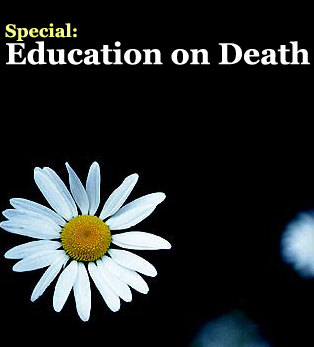 |
Editor's Note: To be or not to be, that is the question. More than a question, death is a taboo subject in Chinese culture and education. The curriculum provides rare discourse about death, which everyone definitely will face, the moment to say the final goodbye to their beloved and the world. It was in 2008, after the deadly Wenchuan earthquake killed tens of thousands of Chinese, that some universities piloted programs to help students develop a rational understanding of death. Previous media reports found that Chinese parents strongly objected to any attempt to talk about death in the classroom. But, can we really avoid it? Isn't it a core part of life? This special coverage "Education on Death" aims to present arguments for China to promote death education and ways in an environment traditionally hostile to the topic. |
|
The term "death education" refers to a variety of educational activities and experiences related to death and embraces such core topics as meanings and attitudes toward death.? It? assumes that individuals and institutions will be better able to deal with death-related practices as a result of educational efforts.? Here are some opinions of a preschool education professor, a teacher, a nurse, an organ donation coordinator and a flim director. |
Too Young to Face the Question?
A 6-year-old girl asks after watching a movie with her mother, "Mom, will I die?" The mother immediately replies angrily, "Shut up! Little girls should never mention death. It's bad luck!" This mother, like any other parent in China, may not see it as an appropriate question from a child.? |
No Fear towards Death
For some, helping people cope with death is part of their job. Yuan Shuping is a young nurse in a retirement home, while Gao Min is a tissue and organ donation coordinator with Shenzhen Red Cross Society. For Yuan and Gao it is an everyday experience that has inspired how they think about life. |
|
Film director urges soul-searching in education
|
Teacher suggests inclusion of death education Education on death, a core part of education on life and living, can help people become less worried or anxious about death, develop a rational thinking of death as a natural ending of everything in the world, and improve their quality of life, said Dong Changhong. |
Significance of Education on Death None of us are immortal, why not let yourself and people around you be educated and face death with dignity? Open discussions on the topic may become an inspiration for you to cherish life and realize the value of life.
|
|
Death education-related study is rare in China. Death education hasn't been paid proper attention by educators and scholars of educational theory in China. There's no official document from the Chinese educational authority to apply related content to the nation's education system. No primary or secondary schools have such courses or put related content in science or health classes. Lectures and optional courses on death are available at some universities, such as Guangdong Pharmaceutical University, Guangzhou University and South China Agricultural University. Learning to write one's will or epitaph, and visiting funeral parlors are covered in the course. The death education teaches people that death is not far away and to cherish life; it warns us to not take our lives and those of others for granted; it teaches us to improve the quality of our life; it transforms our views on societal values. (Death Education, by Zou Yuhua) |
?

|
Blogger: Death education not practical in China Wuyue Sanren, a known Chinese blogger, considers it impractical to educate people about death in China. Expert: No need to launch death education Lin Ge, an expert on education, says education on death is necessary, especially in this fickle society, and a sophisticated understanding of death can drive people to live with peace of mind. However, he believes it is not necessary to launch a separate program of teaching people about death. "The ideal way would be to include education on death into an overall education on living, with focuses on respecting life, cherishing life and living passionately. Life education is fundamental. How can you know death without understanding life first?" |
|
Death Rituals |
|
A falling leaf returns to its roots The 2007 drama film Getting Home, starring the Chinese king of comedy Zhao Benshan and based on a true story, offers an insightful look into the traditions of Chinese culture regarding death. Just like the Chinese expression, "A falling leaf returns to its roots," Chinese people intend to be buried in their hometowns no matter how much trouble it may take to do so. In the movie, a poor migrant worker employs all kinds of schemes to transport his friend’s corpse from Shenzhen to Chongqing, sometimes inside a giant tire. Also in the movie, a lonely rich man hires people to rehearse his own funeral, complete with loud crying and wailing, which at Chinese funerals is sometimes a show, not true emotion. What is Qingming Festival? Qingming Festival, also known as?Tomb-sweeping Day, is one of the 24 segments of the Chinese calendar. It normally falls on the 4th or 5th of April, between spring plowing and summer weeding, and is a time to pay respects to one's ancestors and to tidy their gravesite. History and evolution Qingming Festival is a time of many different activities, among which the main ones are tomb sweeping and? flying kites. Some other lost customs like wearing willow branches on the head and riding on swings have added infinite joy in past days. The festival is a combination of sadness and happiness. Read further about how?the day is marked in Taiyuan, Shanghai,?and Xiamen |
|
|
 |
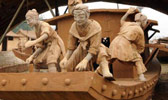 |
 |
 |
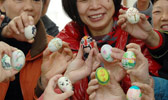
|
| Chinese kites | History in clay | Sacrificial offerings | Egg collision game | Painting on eggs |
|
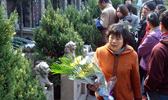 |
 |
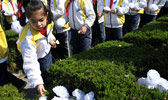 |
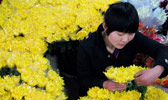 |
 |
| Visiting grave sites | Flower burials | Martyrs remembered | Flower prices surge | Enjoy spring tea |
|
Funeral Customs |
|
The Changing Culture |
|
 |
Mini-burials More Beijingers are being buried at sea, helping to save space and the environment, according to the capital's funeral authorities. Despite the Beijing municipal government's two decades-old push to encourage "green interments", including so-called tree burials, only 2 percent of families choose those methods of burial. In Tianjin, the public opinion is also divided. Chinese people have started experimenting with a convenient, low-cost and low-carbon way to pay respects to the dead by just clicking a mouse. |
|
Focus: A GRAVE CONCERN |
|
|
[Source: China Healthcare Holdings Ltd] |
|
Travel Tips |
|
Wondering what to do to keep your Qingming Festival "clean" and "bright"? Here's a few suggestions on enjoying the festival while learning more about it at the same time.
|
Departure Gate: Shanxi Mianshan Jie Zitui, one-time follower of Duke Wen of Jin, died for his principles in the Spring and Autumn Period. His admonition to his pupil king to be qing (clean, uncorrupted), and ming (brilliant) became the source of the holiday commemorating his death. Mianshan Mountain, where Jie lived, is renowned for its naturally formed caves, palaces and plank passages embedded onto cliffs. Its numerous waterfalls never fail to appeal. The mountainous area is also perfect for hiking. Outing for festival traditions The Beijing Botanical Garden will host an event featuring Qingming culture and traditions, including a "Stories of Qingming" lecture, a feature gallery, seasonal plants and interactive willow-wreath making. Learn to make zi tui mo The Fig Tree will show you how to make the traditional Qingming pastry zi tui mo or han yan, the ancient Chinese pastry among rural households in Shan'xi. More>> |